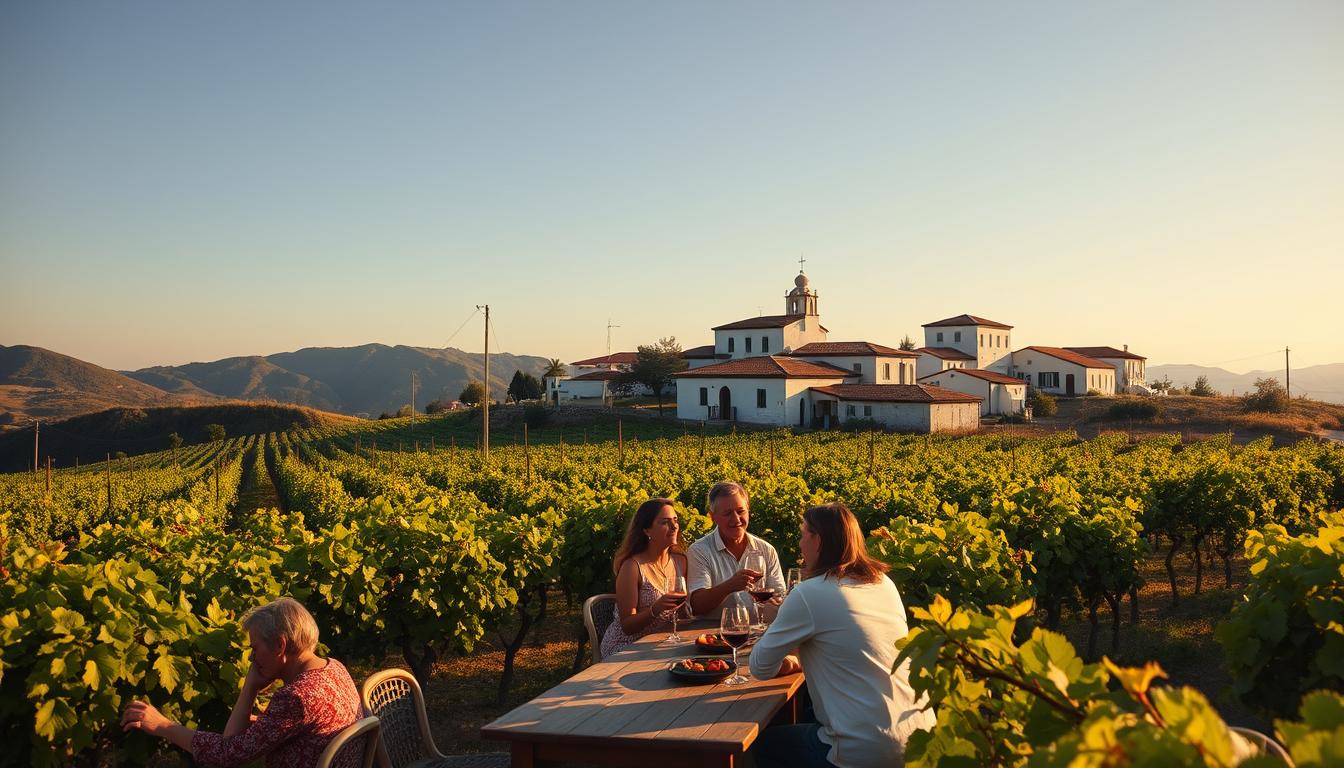Have you ever wondered what makes Greece’s wine culture so unique? While many think of France or Italy for wine adventures, Greece offers a blend of ancient traditions and modern innovation that’s hard to match. With a history dating back thousands of years, Greek winemaking is deeply rooted in the country’s culture and landscape1.
From the volcanic soils of Santorini to the lush vineyards of Crete, Greece is home to over 300 indigenous grape varieties. These rare grapes produce wines with distinct flavors, making every tasting a new discovery. Whether you’re sipping Assyrtiko on a sunset tour or enjoying a Vinsanto aged for 60 months, the experience is unforgettable2.
What sets Greece apart is its ability to balance tradition with innovation. Wineries like Papagiannakos, the first bioclimactic winery, showcase sustainable practices, while others like Boutari continue family legacies that span generations1. This guide will take you through the best wineries, offering tips to make your visit truly special.
Key Takeaways
- Greece’s wine culture combines ancient traditions with modern techniques.
- Over 300 indigenous grape varieties create unique flavors.
- Santorini’s volcanic soils produce standout wines like Assyrtiko.
- Wineries like Papagiannakos lead in sustainable winemaking.
- Family-run estates like Boutari preserve generations of expertise.
Exploring the Rich Heritage of Greek Wine
The story of Greek wine is a tapestry woven with history, mythology, and tradition. Its roots stretch back over 4,000 years, making it one of the oldest wine-producing regions in the world3. From the Minoan and Mycenaean civilizations to today, wine has been a cornerstone of Greek culture and celebration.
Ancient Traditions and Historical Roots
Greek viticulture dates back to ancient times, with evidence of winemaking found in archaeological sites from the 7th century BC. The Minoans, known for their advanced civilization, were among the first to cultivate grapes and produce wine3. These early practices laid the foundation for the diverse wine culture we see today.
Modern winemaking in Greece still reflects these ancient traditions. From the volcanic soils of Santorini to the fertile plains of Nemea, the methods and varieties have evolved but remain deeply connected to their historical roots4.
Mythology and the Role of Dionysus
In Greek mythology, wine was considered a divine gift, closely associated with Dionysus, the god of wine and fertility. Dionysus was celebrated for bringing joy and ecstasy through wine, making it a central element of religious and social gatherings3.
“Wine is the mirror of the soul,” a saying often attributed to ancient Greeks, reflects the deep cultural significance of this beverage.
Even today, the spirit of Dionysus lives on in Greek wine festivals, where locals and visitors alike celebrate the harvest with music, dance, and tastings3.
This rich heritage continues to shape the identity of Greek wine, blending ancient rituals with modern innovation. Whether you’re exploring a family-run winery or tasting a rare indigenous grape, you’re part of a tradition that spans millennia.
Diverse Regions of Greek Winemaking

The diversity of Greece’s wine regions is as rich as its history. From the rugged mountains of the mainland to the sun-drenched Aegean Islands, each area offers unique flavors shaped by its geography. This contrast creates a fascinating tapestry of winemaking traditions5.
Mainland Wonders vs. Island Influences
The mainland, with its varied microclimates, produces robust reds like Agiorgitiko from Nemea. These wines are known for their depth and complexity, thanks to the fertile soils and cooler climates6. In contrast, the islands, particularly Santorini, are famous for mineral-rich Assyrtiko. This white variety thrives in volcanic soil, offering crisp, dry flavors7.
Maritime influences play a significant role in island winemaking. The sea breeze and salty air add a distinct character to the wines. For example, the Muscat Blanc from Samos is celebrated for its aromatic profile, ranging from dry to sweet6.
Traditional methods are still preserved in rural vineyards, ensuring the authenticity of each region’s production. Whether it’s the sun-soaked vines of Crete or the high-altitude vineyards of Central Greece, the commitment to quality remains unwavering7.
“The land shapes the wine, and in Greece, every sip tells a story of its origin.”
Indigenous grape varieties like Xinomavro and Moschofilero are central to Greece’s winemaking identity. These grapes, cultivated for centuries, reflect the unique terroir of their regions. The result is a diverse range of wines that capture the essence of Greece5.
How to Experience Greek Wine Culture: Top Wineries to Visit
Discover the essence of Greece through its world-class wineries and vineyards. Each estate offers a unique blend of history, innovation, and breathtaking scenery. Whether you’re exploring the volcanic soils of Santorini or the lush landscapes of Crete, these wineries promise an unforgettable journey.
Highlights from Renowned Wine Estates
Greece is home to some of the most celebrated wine estates, each with its own story. Domaine Nikolaou, established in the 1930s, is a pioneer in modern winemaking, blending tradition with cutting-edge techniques8. Meanwhile, Semeli Estate in the Peloponnese boasts over four decades of vine cultivation, producing exceptional wines like Agiorgitiko8.
For a taste of innovation, visit Petralona Winery, where scientific methods meet traditional practices. Their wines reflect the unique terroir of the region, offering a true taste of Greece8.
Unique Aspects of Each Winery Experience
Every winery offers something special. At Domaine Florian, the elevation and proximity to Mount Olympus create a microclimate that enhances the flavors of their wines8. In Santorini, the ancient Vriniotis Winery revives the extinct Vradiano grape, showcasing Greece’s rich viticultural heritage8.
Many estates also feature onsite restaurants, where you can pair your tasting with traditional Greek dishes. This combination of wine and cuisine elevates the experience, making it a feast for the senses.
Tips for Making the Most of Your Visit
To fully enjoy your winery trip, plan ahead. Visit during the off-season to avoid crowds and enjoy a more intimate experience. Make a list of must-visit estates, focusing on those that align with your preferences.
Don’t miss the chance to try signature wines like Agiorgitiko or Assyrtiko. Engage with the winemaker to learn about the production process and the history behind each bottle. For a deeper dive into Greece’s wine culture, check out this beginner’s guide.
Planning a Memorable Wine Tour in Greece

A wine tour in Greece is more than a trip—it’s a celebration of history, culture, and craftsmanship. From the volcanic soils of Santorini to the lush vineyards of Crete, each region offers a unique experience. Planning your itinerary carefully ensures you make the most of your time and savor every moment.
Curating an Ideal Itinerary
Start your journey in Athens, where you can explore urban wineries before heading to the islands. A typical tour might include a day in Crete, known for its indigenous varieties like Vidiano and Liatiko, followed by a visit to Santorini for its iconic Assyrtiko9. Travel between regions is seamless, with flights from Athens to Santorini taking just 50 minutes9.
Plan your days to balance tastings with relaxation. For example, spend a morning at Domaine Sigalas in Santorini, enjoying vineyard walks and tastings, then unwind at a seaside taverna in the afternoon10. This way, you’ll experience both the wine and the local culture.
Seasonal Considerations and Scheduling
The best time for a wine tour is during spring (April to June) or fall (September to October). These seasons offer mild weather and fewer crowds, making it easier to enjoy your trip10. Avoid the peak summer months, when temperatures can soar and wineries are busier.
Harvest season, typically in August, is another exciting time to visit. Many wineries host festivals, like the Santorini Wine Festival, where you can celebrate the year’s harvest with locals10. Booking accommodations and tours in advance is essential during these periods.
For a deeper dive into Greece’s wine culture, consider visiting top wineries to visit on Greek. This guide will help you craft an itinerary that combines history, flavor, and unforgettable experiences.
Insider Tips for Wine Tasting and Cultural Immersion
Unlock the secrets of Greece’s wine heritage with expert tasting tips. From the volcanic soils of Santorini to the sun-kissed vineyards of Crete, every sip tells a story. Learn how to discern quality and appreciate the nuances of indigenous grape varieties.
Expert Advice on Wine Tasting Techniques
Start by observing the wine’s color and clarity. Swirl the glass gently to release its aromas. Take a moment to inhale deeply, identifying notes of citrus, herbs, or minerals. This technique helps you appreciate the complexity of Assyrtiko, Santorini’s standout grape variety10.
When tasting, let the wine coat your palate. Notice its body, acidity, and finish. “A great wine balances these elements harmoniously,” says a local winemaker. This approach works for both whites like Vidiano from Crete and reds like Agiorgitiko from Nemea11.
Appreciating Indigenous Grape Varieties
Each region offers unique flavors shaped by its terroir. In Crete, Vidiano is celebrated for its aromatic profile, while Liatiko offers a softer, fruitier taste11. These indigenous grapes reflect the country’s rich viticultural heritage.
For a classic Greek experience, explore lesser-known estates. Many family-run wineries in Crete welcome visitors for intimate tastings. These hidden gems often provide a deeper connection to the culture and traditions of winemaking11.
Practical Tips for an Immersive Experience
Plan your visit during spring or fall for optimal vineyard conditions. Engage with winemakers to learn about their craft and the history behind each bottle. Pair your tasting with local dishes for a complete sensory journey10.
Don’t rush. Take your time to savor each wine and its story. Whether you’re in Santorini or Crete, these insider tips will elevate your wine tasting experience and leave you with lasting memories.
Conclusion
Greece’s wine journey is a blend of ancient traditions and modern innovation. From the volcanic soils of Santorini to the fertile plains of Nemea, each region offers unique flavors shaped by its terroir. Indigenous grape varieties like Assyrtiko and Agiorgitiko highlight the country’s rich viticultural heritage12.
Family-run estates and sustainable wineries, such as Lyrarakis and Domaine Sigalas, showcase the dedication to quality and tradition. These wineries not only produce exceptional wines but also provide immersive experiences, from vineyard tours to tastings paired with local cuisine12.
Planning a wine tour in Greece is an opportunity to explore its diverse regions and connect with its culture. Whether you’re in Crete or the Peloponnese, each visit offers a chance to savor the flavors and stories behind every bottle. Start your journey today and discover why Greece is a must-visit destination for wine enthusiasts.
For more insights on planning your trip, check out this guide to Greek wine travel.
FAQ
What are the best regions for winemaking in Greece?
Which wineries should I visit for an authentic experience?
What makes Santorini’s wine culture unique?
How can I plan a wine tour in Greece?
What should I know about Greek wine tasting?
When is the best time to visit Greek wineries?
Can I combine wine tours with cultural activities?
Source Links
- A Guide To Greece’s Wineries And Vineyards You Can Visit
- The 15 Best Wineries to Visit in Santorini – Greece Is
- Greece Wine Vacations: Exploring the Birthplace of Dionysus
- Exploring the Riches of Wine Tourism in Greece
- The Ultimate Guide To Greek Wine
- Greek Vineyards: Wine Experiences Worth Savoring
- Which Wine to Try? Greece’s New Wine Stars Offer Top Tips | travel.gr
- Your 2025 Guide to Greek wines and wineries
- Wine Travel In Greece: Planning A Classic Route Through Santorini And Crete
- Guide to Best Wine Tasting Tours in Santorini, Greece
- Best Greek Wineries in Peloponnese: Wine Tasting & Tours 2025
- Sipping and Savoring the Flavors of Crete – Traveling with Sweeney

















